Ethical Issues in Healthcare: Challenges in the New Zealand System
VerifiedAdded on 2020/03/04
|8
|2621
|47
Essay
AI Summary
This essay delves into the ethical challenges prevalent within the New Zealand healthcare system, encompassing issues faced by both students and professionals. It identifies key concerns such as unsafe work environments, breaches of patient privacy and confidentiality, and the impact of inadequate support and supervision. The essay examines the causes of these ethical dilemmas, including conflicts in values, cultural differences, and the impact of institutional commitment on the workforce. It highlights the distress experienced by healthcare practitioners and students, emphasizing the importance of addressing these issues to ensure optimal patient care and professional well-being. The essay also touches upon the ethical considerations surrounding end-of-life care and the impact of dishonesty within the healthcare system, underscoring the need for robust ethical frameworks and supportive environments.
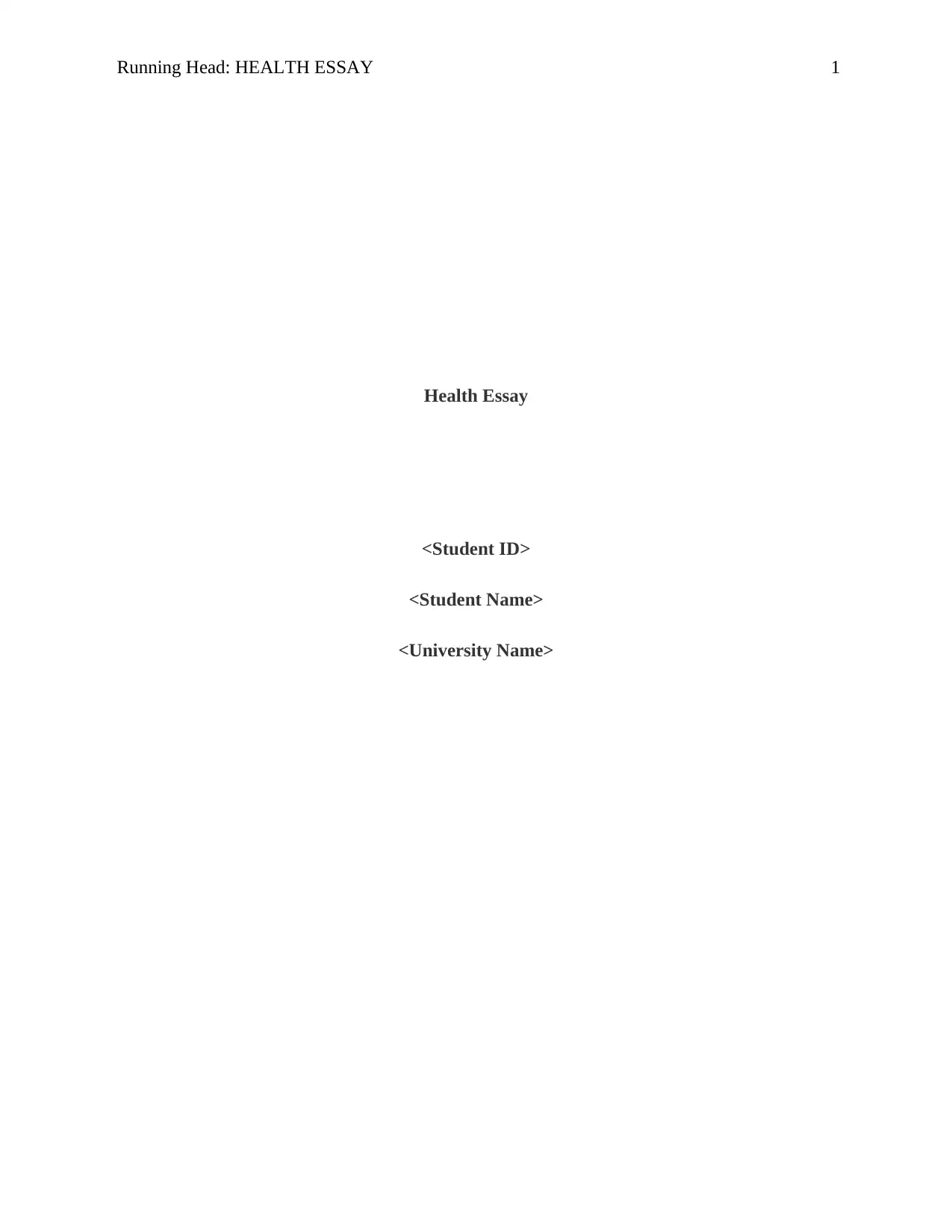
Running Head: HEALTH ESSAY 1
Health Essay
<Student ID>
<Student Name>
<University Name>
Health Essay
<Student ID>
<Student Name>
<University Name>
Paraphrase This Document
Need a fresh take? Get an instant paraphrase of this document with our AI Paraphraser
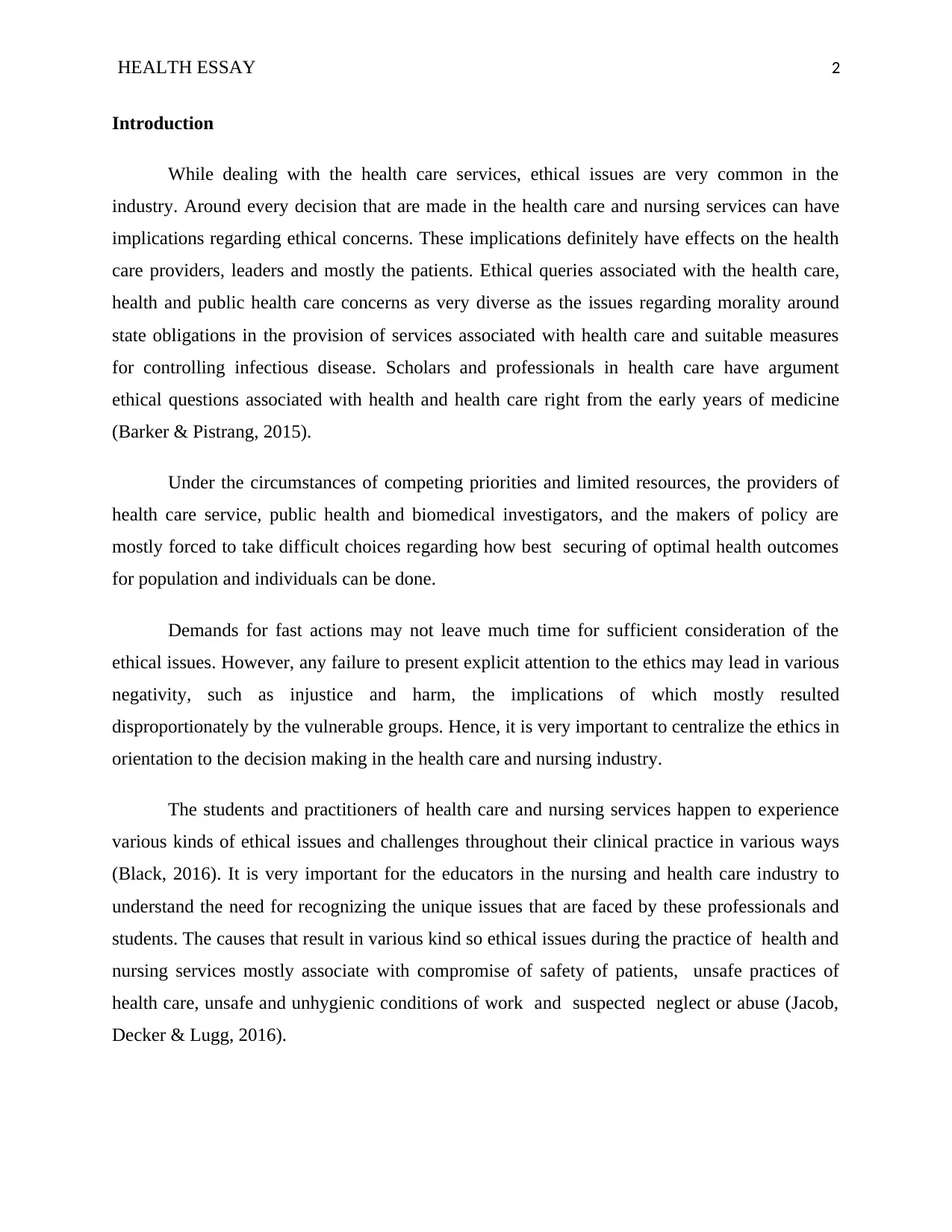
HEALTH ESSAY 2
Introduction
While dealing with the health care services, ethical issues are very common in the
industry. Around every decision that are made in the health care and nursing services can have
implications regarding ethical concerns. These implications definitely have effects on the health
care providers, leaders and mostly the patients. Ethical queries associated with the health care,
health and public health care concerns as very diverse as the issues regarding morality around
state obligations in the provision of services associated with health care and suitable measures
for controlling infectious disease. Scholars and professionals in health care have argument
ethical questions associated with health and health care right from the early years of medicine
(Barker & Pistrang, 2015).
Under the circumstances of competing priorities and limited resources, the providers of
health care service, public health and biomedical investigators, and the makers of policy are
mostly forced to take difficult choices regarding how best securing of optimal health outcomes
for population and individuals can be done.
Demands for fast actions may not leave much time for sufficient consideration of the
ethical issues. However, any failure to present explicit attention to the ethics may lead in various
negativity, such as injustice and harm, the implications of which mostly resulted
disproportionately by the vulnerable groups. Hence, it is very important to centralize the ethics in
orientation to the decision making in the health care and nursing industry.
The students and practitioners of health care and nursing services happen to experience
various kinds of ethical issues and challenges throughout their clinical practice in various ways
(Black, 2016). It is very important for the educators in the nursing and health care industry to
understand the need for recognizing the unique issues that are faced by these professionals and
students. The causes that result in various kind so ethical issues during the practice of health and
nursing services mostly associate with compromise of safety of patients, unsafe practices of
health care, unsafe and unhygienic conditions of work and suspected neglect or abuse (Jacob,
Decker & Lugg, 2016).
Introduction
While dealing with the health care services, ethical issues are very common in the
industry. Around every decision that are made in the health care and nursing services can have
implications regarding ethical concerns. These implications definitely have effects on the health
care providers, leaders and mostly the patients. Ethical queries associated with the health care,
health and public health care concerns as very diverse as the issues regarding morality around
state obligations in the provision of services associated with health care and suitable measures
for controlling infectious disease. Scholars and professionals in health care have argument
ethical questions associated with health and health care right from the early years of medicine
(Barker & Pistrang, 2015).
Under the circumstances of competing priorities and limited resources, the providers of
health care service, public health and biomedical investigators, and the makers of policy are
mostly forced to take difficult choices regarding how best securing of optimal health outcomes
for population and individuals can be done.
Demands for fast actions may not leave much time for sufficient consideration of the
ethical issues. However, any failure to present explicit attention to the ethics may lead in various
negativity, such as injustice and harm, the implications of which mostly resulted
disproportionately by the vulnerable groups. Hence, it is very important to centralize the ethics in
orientation to the decision making in the health care and nursing industry.
The students and practitioners of health care and nursing services happen to experience
various kinds of ethical issues and challenges throughout their clinical practice in various ways
(Black, 2016). It is very important for the educators in the nursing and health care industry to
understand the need for recognizing the unique issues that are faced by these professionals and
students. The causes that result in various kind so ethical issues during the practice of health and
nursing services mostly associate with compromise of safety of patients, unsafe practices of
health care, unsafe and unhygienic conditions of work and suspected neglect or abuse (Jacob,
Decker & Lugg, 2016).
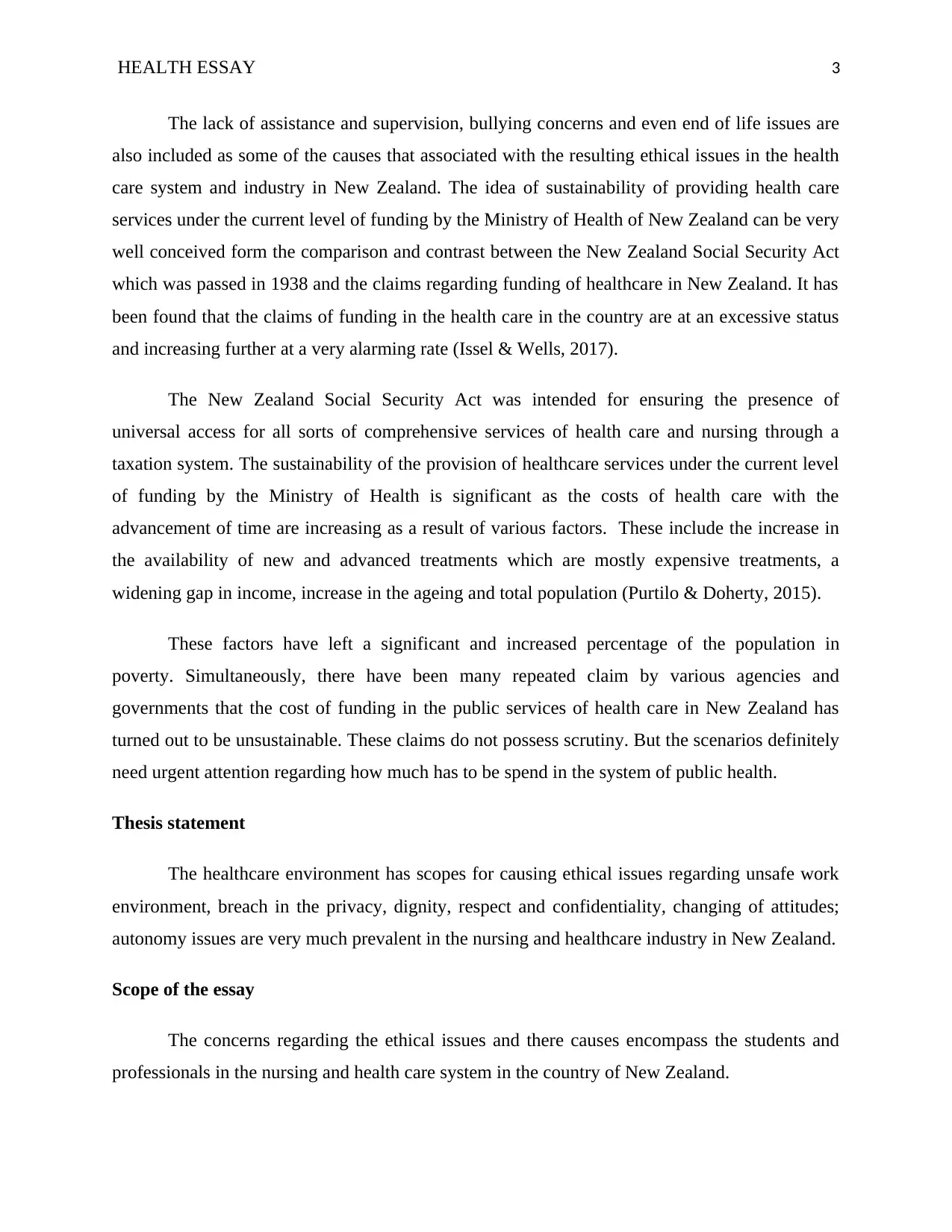
HEALTH ESSAY 3
The lack of assistance and supervision, bullying concerns and even end of life issues are
also included as some of the causes that associated with the resulting ethical issues in the health
care system and industry in New Zealand. The idea of sustainability of providing health care
services under the current level of funding by the Ministry of Health of New Zealand can be very
well conceived form the comparison and contrast between the New Zealand Social Security Act
which was passed in 1938 and the claims regarding funding of healthcare in New Zealand. It has
been found that the claims of funding in the health care in the country are at an excessive status
and increasing further at a very alarming rate (Issel & Wells, 2017).
The New Zealand Social Security Act was intended for ensuring the presence of
universal access for all sorts of comprehensive services of health care and nursing through a
taxation system. The sustainability of the provision of healthcare services under the current level
of funding by the Ministry of Health is significant as the costs of health care with the
advancement of time are increasing as a result of various factors. These include the increase in
the availability of new and advanced treatments which are mostly expensive treatments, a
widening gap in income, increase in the ageing and total population (Purtilo & Doherty, 2015).
These factors have left a significant and increased percentage of the population in
poverty. Simultaneously, there have been many repeated claim by various agencies and
governments that the cost of funding in the public services of health care in New Zealand has
turned out to be unsustainable. These claims do not possess scrutiny. But the scenarios definitely
need urgent attention regarding how much has to be spend in the system of public health.
Thesis statement
The healthcare environment has scopes for causing ethical issues regarding unsafe work
environment, breach in the privacy, dignity, respect and confidentiality, changing of attitudes;
autonomy issues are very much prevalent in the nursing and healthcare industry in New Zealand.
Scope of the essay
The concerns regarding the ethical issues and there causes encompass the students and
professionals in the nursing and health care system in the country of New Zealand.
The lack of assistance and supervision, bullying concerns and even end of life issues are
also included as some of the causes that associated with the resulting ethical issues in the health
care system and industry in New Zealand. The idea of sustainability of providing health care
services under the current level of funding by the Ministry of Health of New Zealand can be very
well conceived form the comparison and contrast between the New Zealand Social Security Act
which was passed in 1938 and the claims regarding funding of healthcare in New Zealand. It has
been found that the claims of funding in the health care in the country are at an excessive status
and increasing further at a very alarming rate (Issel & Wells, 2017).
The New Zealand Social Security Act was intended for ensuring the presence of
universal access for all sorts of comprehensive services of health care and nursing through a
taxation system. The sustainability of the provision of healthcare services under the current level
of funding by the Ministry of Health is significant as the costs of health care with the
advancement of time are increasing as a result of various factors. These include the increase in
the availability of new and advanced treatments which are mostly expensive treatments, a
widening gap in income, increase in the ageing and total population (Purtilo & Doherty, 2015).
These factors have left a significant and increased percentage of the population in
poverty. Simultaneously, there have been many repeated claim by various agencies and
governments that the cost of funding in the public services of health care in New Zealand has
turned out to be unsustainable. These claims do not possess scrutiny. But the scenarios definitely
need urgent attention regarding how much has to be spend in the system of public health.
Thesis statement
The healthcare environment has scopes for causing ethical issues regarding unsafe work
environment, breach in the privacy, dignity, respect and confidentiality, changing of attitudes;
autonomy issues are very much prevalent in the nursing and healthcare industry in New Zealand.
Scope of the essay
The concerns regarding the ethical issues and there causes encompass the students and
professionals in the nursing and health care system in the country of New Zealand.
⊘ This is a preview!⊘
Do you want full access?
Subscribe today to unlock all pages.

Trusted by 1+ million students worldwide
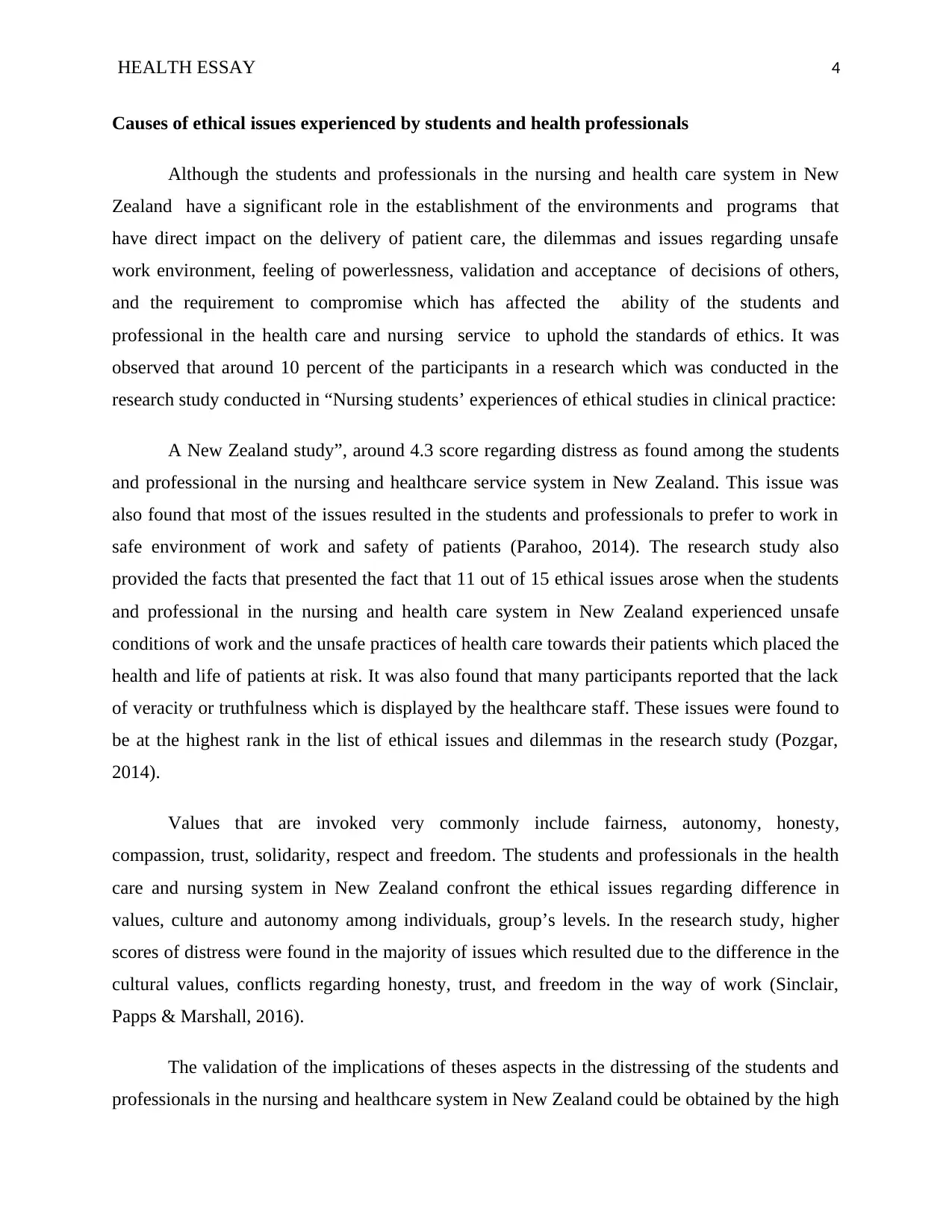
HEALTH ESSAY 4
Causes of ethical issues experienced by students and health professionals
Although the students and professionals in the nursing and health care system in New
Zealand have a significant role in the establishment of the environments and programs that
have direct impact on the delivery of patient care, the dilemmas and issues regarding unsafe
work environment, feeling of powerlessness, validation and acceptance of decisions of others,
and the requirement to compromise which has affected the ability of the students and
professional in the health care and nursing service to uphold the standards of ethics. It was
observed that around 10 percent of the participants in a research which was conducted in the
research study conducted in “Nursing students’ experiences of ethical studies in clinical practice:
A New Zealand study”, around 4.3 score regarding distress as found among the students
and professional in the nursing and healthcare service system in New Zealand. This issue was
also found that most of the issues resulted in the students and professionals to prefer to work in
safe environment of work and safety of patients (Parahoo, 2014). The research study also
provided the facts that presented the fact that 11 out of 15 ethical issues arose when the students
and professional in the nursing and health care system in New Zealand experienced unsafe
conditions of work and the unsafe practices of health care towards their patients which placed the
health and life of patients at risk. It was also found that many participants reported that the lack
of veracity or truthfulness which is displayed by the healthcare staff. These issues were found to
be at the highest rank in the list of ethical issues and dilemmas in the research study (Pozgar,
2014).
Values that are invoked very commonly include fairness, autonomy, honesty,
compassion, trust, solidarity, respect and freedom. The students and professionals in the health
care and nursing system in New Zealand confront the ethical issues regarding difference in
values, culture and autonomy among individuals, group’s levels. In the research study, higher
scores of distress were found in the majority of issues which resulted due to the difference in the
cultural values, conflicts regarding honesty, trust, and freedom in the way of work (Sinclair,
Papps & Marshall, 2016).
The validation of the implications of theses aspects in the distressing of the students and
professionals in the nursing and healthcare system in New Zealand could be obtained by the high
Causes of ethical issues experienced by students and health professionals
Although the students and professionals in the nursing and health care system in New
Zealand have a significant role in the establishment of the environments and programs that
have direct impact on the delivery of patient care, the dilemmas and issues regarding unsafe
work environment, feeling of powerlessness, validation and acceptance of decisions of others,
and the requirement to compromise which has affected the ability of the students and
professional in the health care and nursing service to uphold the standards of ethics. It was
observed that around 10 percent of the participants in a research which was conducted in the
research study conducted in “Nursing students’ experiences of ethical studies in clinical practice:
A New Zealand study”, around 4.3 score regarding distress as found among the students
and professional in the nursing and healthcare service system in New Zealand. This issue was
also found that most of the issues resulted in the students and professionals to prefer to work in
safe environment of work and safety of patients (Parahoo, 2014). The research study also
provided the facts that presented the fact that 11 out of 15 ethical issues arose when the students
and professional in the nursing and health care system in New Zealand experienced unsafe
conditions of work and the unsafe practices of health care towards their patients which placed the
health and life of patients at risk. It was also found that many participants reported that the lack
of veracity or truthfulness which is displayed by the healthcare staff. These issues were found to
be at the highest rank in the list of ethical issues and dilemmas in the research study (Pozgar,
2014).
Values that are invoked very commonly include fairness, autonomy, honesty,
compassion, trust, solidarity, respect and freedom. The students and professionals in the health
care and nursing system in New Zealand confront the ethical issues regarding difference in
values, culture and autonomy among individuals, group’s levels. In the research study, higher
scores of distress were found in the majority of issues which resulted due to the difference in the
cultural values, conflicts regarding honesty, trust, and freedom in the way of work (Sinclair,
Papps & Marshall, 2016).
The validation of the implications of theses aspects in the distressing of the students and
professionals in the nursing and healthcare system in New Zealand could be obtained by the high
Paraphrase This Document
Need a fresh take? Get an instant paraphrase of this document with our AI Paraphraser
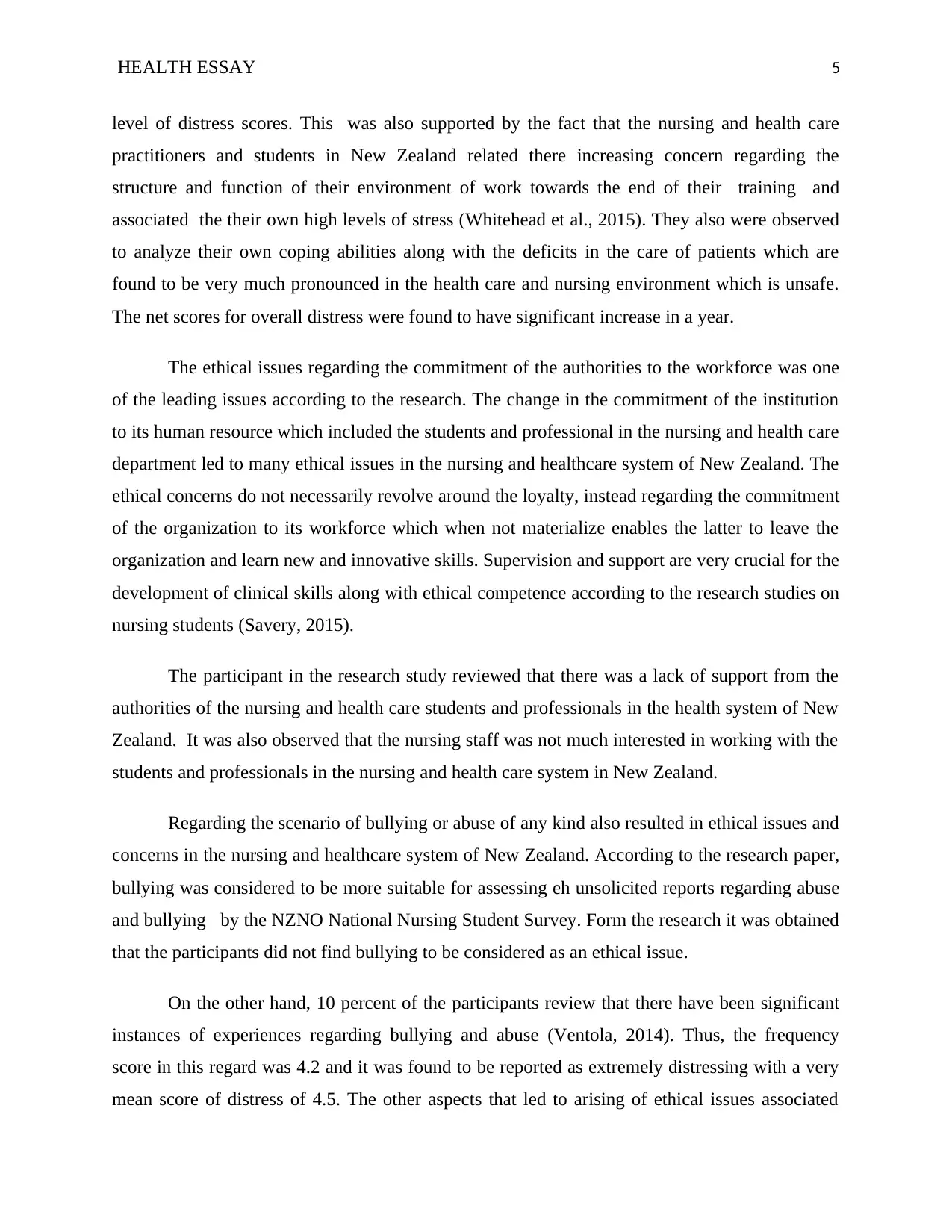
HEALTH ESSAY 5
level of distress scores. This was also supported by the fact that the nursing and health care
practitioners and students in New Zealand related there increasing concern regarding the
structure and function of their environment of work towards the end of their training and
associated the their own high levels of stress (Whitehead et al., 2015). They also were observed
to analyze their own coping abilities along with the deficits in the care of patients which are
found to be very much pronounced in the health care and nursing environment which is unsafe.
The net scores for overall distress were found to have significant increase in a year.
The ethical issues regarding the commitment of the authorities to the workforce was one
of the leading issues according to the research. The change in the commitment of the institution
to its human resource which included the students and professional in the nursing and health care
department led to many ethical issues in the nursing and healthcare system of New Zealand. The
ethical concerns do not necessarily revolve around the loyalty, instead regarding the commitment
of the organization to its workforce which when not materialize enables the latter to leave the
organization and learn new and innovative skills. Supervision and support are very crucial for the
development of clinical skills along with ethical competence according to the research studies on
nursing students (Savery, 2015).
The participant in the research study reviewed that there was a lack of support from the
authorities of the nursing and health care students and professionals in the health system of New
Zealand. It was also observed that the nursing staff was not much interested in working with the
students and professionals in the nursing and health care system in New Zealand.
Regarding the scenario of bullying or abuse of any kind also resulted in ethical issues and
concerns in the nursing and healthcare system of New Zealand. According to the research paper,
bullying was considered to be more suitable for assessing eh unsolicited reports regarding abuse
and bullying by the NZNO National Nursing Student Survey. Form the research it was obtained
that the participants did not find bullying to be considered as an ethical issue.
On the other hand, 10 percent of the participants review that there have been significant
instances of experiences regarding bullying and abuse (Ventola, 2014). Thus, the frequency
score in this regard was 4.2 and it was found to be reported as extremely distressing with a very
mean score of distress of 4.5. The other aspects that led to arising of ethical issues associated
level of distress scores. This was also supported by the fact that the nursing and health care
practitioners and students in New Zealand related there increasing concern regarding the
structure and function of their environment of work towards the end of their training and
associated the their own high levels of stress (Whitehead et al., 2015). They also were observed
to analyze their own coping abilities along with the deficits in the care of patients which are
found to be very much pronounced in the health care and nursing environment which is unsafe.
The net scores for overall distress were found to have significant increase in a year.
The ethical issues regarding the commitment of the authorities to the workforce was one
of the leading issues according to the research. The change in the commitment of the institution
to its human resource which included the students and professional in the nursing and health care
department led to many ethical issues in the nursing and healthcare system of New Zealand. The
ethical concerns do not necessarily revolve around the loyalty, instead regarding the commitment
of the organization to its workforce which when not materialize enables the latter to leave the
organization and learn new and innovative skills. Supervision and support are very crucial for the
development of clinical skills along with ethical competence according to the research studies on
nursing students (Savery, 2015).
The participant in the research study reviewed that there was a lack of support from the
authorities of the nursing and health care students and professionals in the health system of New
Zealand. It was also observed that the nursing staff was not much interested in working with the
students and professionals in the nursing and health care system in New Zealand.
Regarding the scenario of bullying or abuse of any kind also resulted in ethical issues and
concerns in the nursing and healthcare system of New Zealand. According to the research paper,
bullying was considered to be more suitable for assessing eh unsolicited reports regarding abuse
and bullying by the NZNO National Nursing Student Survey. Form the research it was obtained
that the participants did not find bullying to be considered as an ethical issue.
On the other hand, 10 percent of the participants review that there have been significant
instances of experiences regarding bullying and abuse (Ventola, 2014). Thus, the frequency
score in this regard was 4.2 and it was found to be reported as extremely distressing with a very
mean score of distress of 4.5. The other aspects that led to arising of ethical issues associated
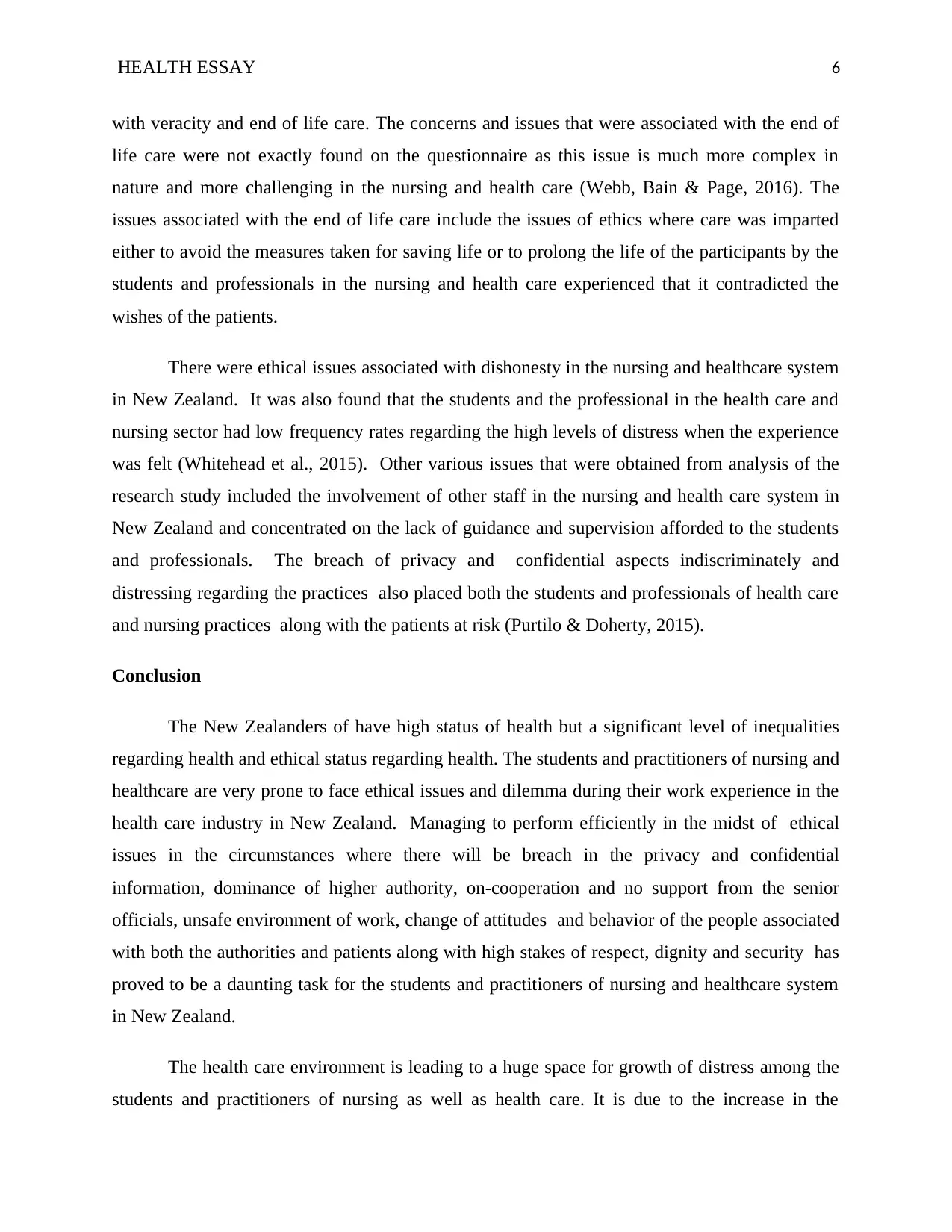
HEALTH ESSAY 6
with veracity and end of life care. The concerns and issues that were associated with the end of
life care were not exactly found on the questionnaire as this issue is much more complex in
nature and more challenging in the nursing and health care (Webb, Bain & Page, 2016). The
issues associated with the end of life care include the issues of ethics where care was imparted
either to avoid the measures taken for saving life or to prolong the life of the participants by the
students and professionals in the nursing and health care experienced that it contradicted the
wishes of the patients.
There were ethical issues associated with dishonesty in the nursing and healthcare system
in New Zealand. It was also found that the students and the professional in the health care and
nursing sector had low frequency rates regarding the high levels of distress when the experience
was felt (Whitehead et al., 2015). Other various issues that were obtained from analysis of the
research study included the involvement of other staff in the nursing and health care system in
New Zealand and concentrated on the lack of guidance and supervision afforded to the students
and professionals. The breach of privacy and confidential aspects indiscriminately and
distressing regarding the practices also placed both the students and professionals of health care
and nursing practices along with the patients at risk (Purtilo & Doherty, 2015).
Conclusion
The New Zealanders of have high status of health but a significant level of inequalities
regarding health and ethical status regarding health. The students and practitioners of nursing and
healthcare are very prone to face ethical issues and dilemma during their work experience in the
health care industry in New Zealand. Managing to perform efficiently in the midst of ethical
issues in the circumstances where there will be breach in the privacy and confidential
information, dominance of higher authority, on-cooperation and no support from the senior
officials, unsafe environment of work, change of attitudes and behavior of the people associated
with both the authorities and patients along with high stakes of respect, dignity and security has
proved to be a daunting task for the students and practitioners of nursing and healthcare system
in New Zealand.
The health care environment is leading to a huge space for growth of distress among the
students and practitioners of nursing as well as health care. It is due to the increase in the
with veracity and end of life care. The concerns and issues that were associated with the end of
life care were not exactly found on the questionnaire as this issue is much more complex in
nature and more challenging in the nursing and health care (Webb, Bain & Page, 2016). The
issues associated with the end of life care include the issues of ethics where care was imparted
either to avoid the measures taken for saving life or to prolong the life of the participants by the
students and professionals in the nursing and health care experienced that it contradicted the
wishes of the patients.
There were ethical issues associated with dishonesty in the nursing and healthcare system
in New Zealand. It was also found that the students and the professional in the health care and
nursing sector had low frequency rates regarding the high levels of distress when the experience
was felt (Whitehead et al., 2015). Other various issues that were obtained from analysis of the
research study included the involvement of other staff in the nursing and health care system in
New Zealand and concentrated on the lack of guidance and supervision afforded to the students
and professionals. The breach of privacy and confidential aspects indiscriminately and
distressing regarding the practices also placed both the students and professionals of health care
and nursing practices along with the patients at risk (Purtilo & Doherty, 2015).
Conclusion
The New Zealanders of have high status of health but a significant level of inequalities
regarding health and ethical status regarding health. The students and practitioners of nursing and
healthcare are very prone to face ethical issues and dilemma during their work experience in the
health care industry in New Zealand. Managing to perform efficiently in the midst of ethical
issues in the circumstances where there will be breach in the privacy and confidential
information, dominance of higher authority, on-cooperation and no support from the senior
officials, unsafe environment of work, change of attitudes and behavior of the people associated
with both the authorities and patients along with high stakes of respect, dignity and security has
proved to be a daunting task for the students and practitioners of nursing and healthcare system
in New Zealand.
The health care environment is leading to a huge space for growth of distress among the
students and practitioners of nursing as well as health care. It is due to the increase in the
⊘ This is a preview!⊘
Do you want full access?
Subscribe today to unlock all pages.

Trusted by 1+ million students worldwide
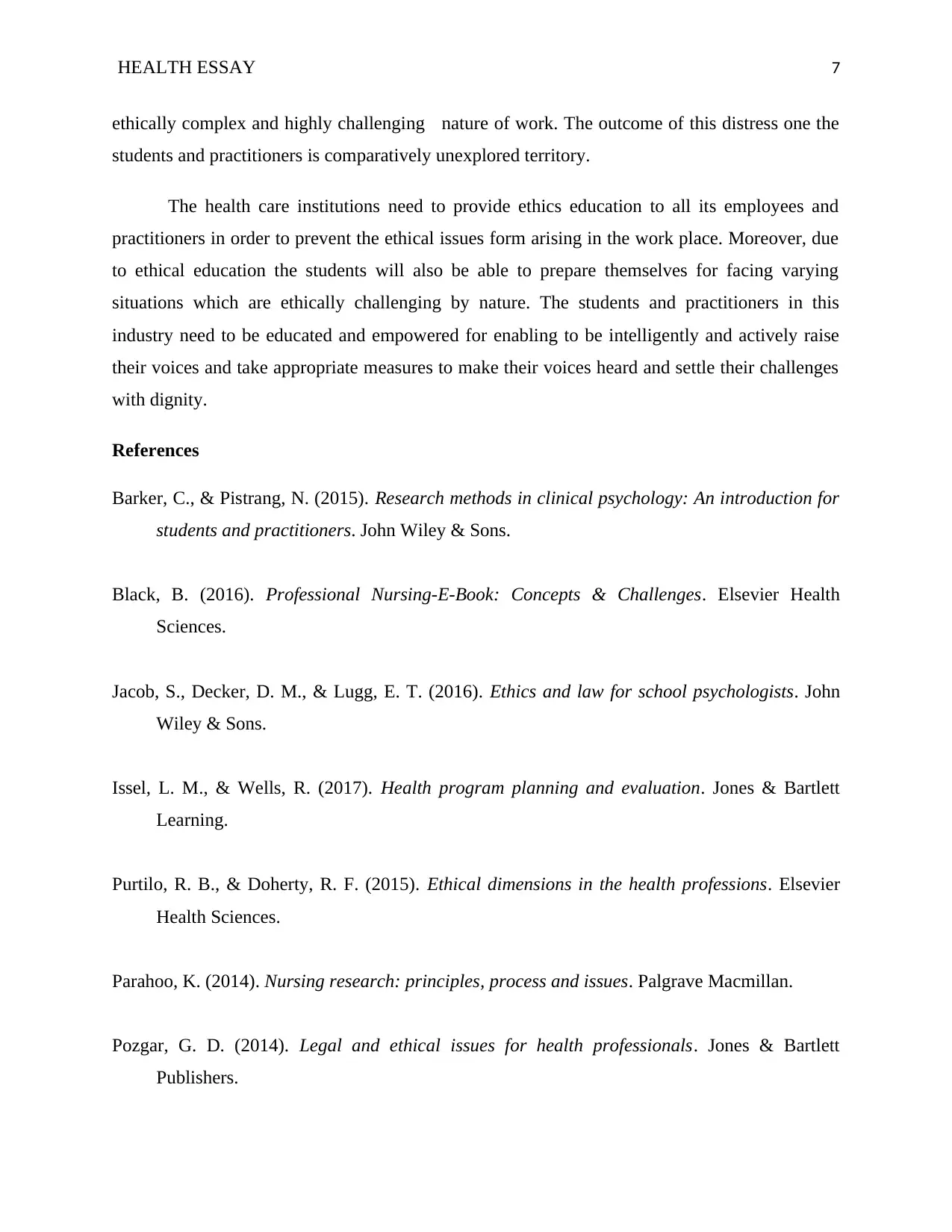
HEALTH ESSAY 7
ethically complex and highly challenging nature of work. The outcome of this distress one the
students and practitioners is comparatively unexplored territory.
The health care institutions need to provide ethics education to all its employees and
practitioners in order to prevent the ethical issues form arising in the work place. Moreover, due
to ethical education the students will also be able to prepare themselves for facing varying
situations which are ethically challenging by nature. The students and practitioners in this
industry need to be educated and empowered for enabling to be intelligently and actively raise
their voices and take appropriate measures to make their voices heard and settle their challenges
with dignity.
References
Barker, C., & Pistrang, N. (2015). Research methods in clinical psychology: An introduction for
students and practitioners. John Wiley & Sons.
Black, B. (2016). Professional Nursing-E-Book: Concepts & Challenges. Elsevier Health
Sciences.
Jacob, S., Decker, D. M., & Lugg, E. T. (2016). Ethics and law for school psychologists. John
Wiley & Sons.
Issel, L. M., & Wells, R. (2017). Health program planning and evaluation. Jones & Bartlett
Learning.
Purtilo, R. B., & Doherty, R. F. (2015). Ethical dimensions in the health professions. Elsevier
Health Sciences.
Parahoo, K. (2014). Nursing research: principles, process and issues. Palgrave Macmillan.
Pozgar, G. D. (2014). Legal and ethical issues for health professionals. Jones & Bartlett
Publishers.
ethically complex and highly challenging nature of work. The outcome of this distress one the
students and practitioners is comparatively unexplored territory.
The health care institutions need to provide ethics education to all its employees and
practitioners in order to prevent the ethical issues form arising in the work place. Moreover, due
to ethical education the students will also be able to prepare themselves for facing varying
situations which are ethically challenging by nature. The students and practitioners in this
industry need to be educated and empowered for enabling to be intelligently and actively raise
their voices and take appropriate measures to make their voices heard and settle their challenges
with dignity.
References
Barker, C., & Pistrang, N. (2015). Research methods in clinical psychology: An introduction for
students and practitioners. John Wiley & Sons.
Black, B. (2016). Professional Nursing-E-Book: Concepts & Challenges. Elsevier Health
Sciences.
Jacob, S., Decker, D. M., & Lugg, E. T. (2016). Ethics and law for school psychologists. John
Wiley & Sons.
Issel, L. M., & Wells, R. (2017). Health program planning and evaluation. Jones & Bartlett
Learning.
Purtilo, R. B., & Doherty, R. F. (2015). Ethical dimensions in the health professions. Elsevier
Health Sciences.
Parahoo, K. (2014). Nursing research: principles, process and issues. Palgrave Macmillan.
Pozgar, G. D. (2014). Legal and ethical issues for health professionals. Jones & Bartlett
Publishers.
Paraphrase This Document
Need a fresh take? Get an instant paraphrase of this document with our AI Paraphraser
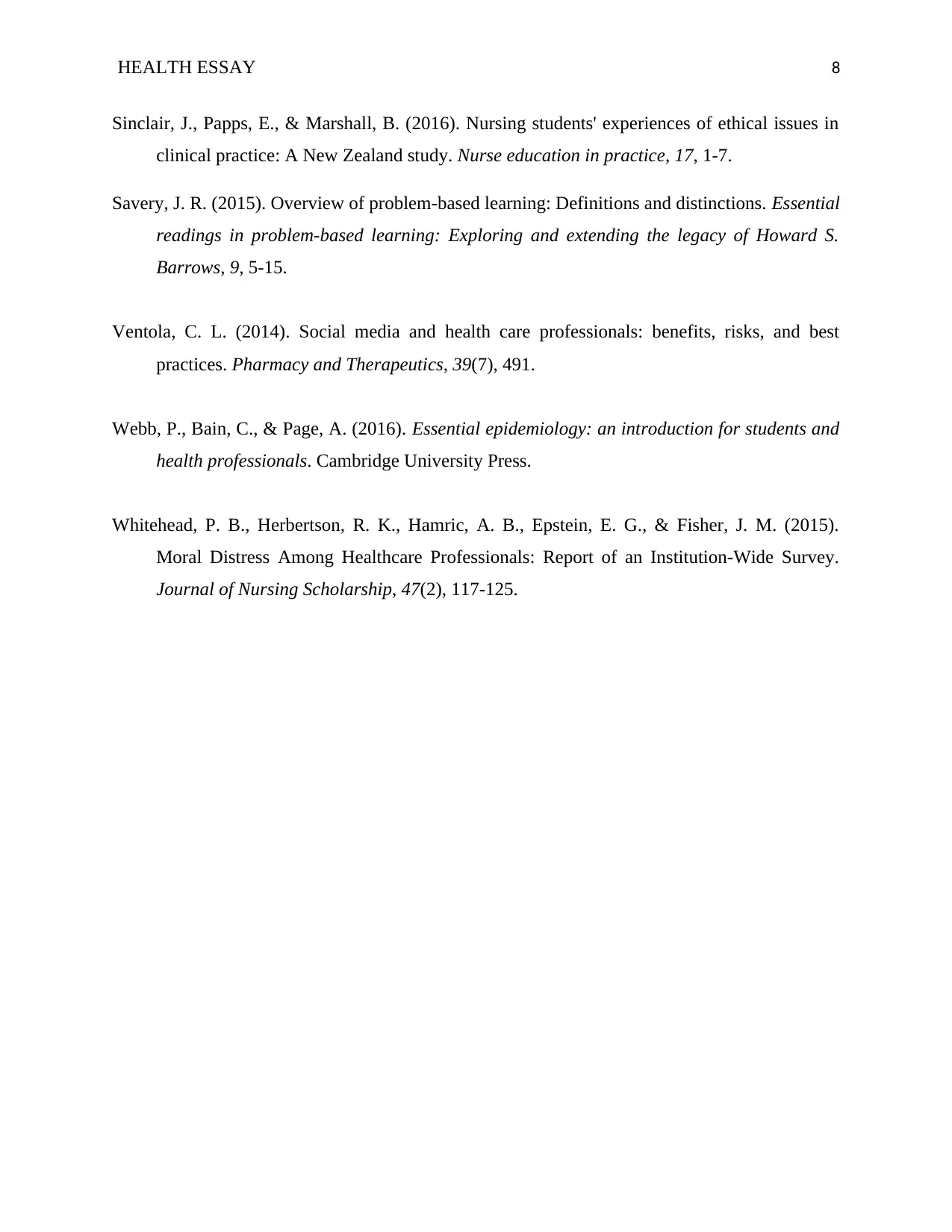
HEALTH ESSAY 8
Sinclair, J., Papps, E., & Marshall, B. (2016). Nursing students' experiences of ethical issues in
clinical practice: A New Zealand study. Nurse education in practice, 17, 1-7.
Savery, J. R. (2015). Overview of problem-based learning: Definitions and distinctions. Essential
readings in problem-based learning: Exploring and extending the legacy of Howard S.
Barrows, 9, 5-15.
Ventola, C. L. (2014). Social media and health care professionals: benefits, risks, and best
practices. Pharmacy and Therapeutics, 39(7), 491.
Webb, P., Bain, C., & Page, A. (2016). Essential epidemiology: an introduction for students and
health professionals. Cambridge University Press.
Whitehead, P. B., Herbertson, R. K., Hamric, A. B., Epstein, E. G., & Fisher, J. M. (2015).
Moral Distress Among Healthcare Professionals: Report of an Institution‐Wide Survey.
Journal of Nursing Scholarship, 47(2), 117-125.
Sinclair, J., Papps, E., & Marshall, B. (2016). Nursing students' experiences of ethical issues in
clinical practice: A New Zealand study. Nurse education in practice, 17, 1-7.
Savery, J. R. (2015). Overview of problem-based learning: Definitions and distinctions. Essential
readings in problem-based learning: Exploring and extending the legacy of Howard S.
Barrows, 9, 5-15.
Ventola, C. L. (2014). Social media and health care professionals: benefits, risks, and best
practices. Pharmacy and Therapeutics, 39(7), 491.
Webb, P., Bain, C., & Page, A. (2016). Essential epidemiology: an introduction for students and
health professionals. Cambridge University Press.
Whitehead, P. B., Herbertson, R. K., Hamric, A. B., Epstein, E. G., & Fisher, J. M. (2015).
Moral Distress Among Healthcare Professionals: Report of an Institution‐Wide Survey.
Journal of Nursing Scholarship, 47(2), 117-125.
1 out of 8
Related Documents
Your All-in-One AI-Powered Toolkit for Academic Success.
+13062052269
info@desklib.com
Available 24*7 on WhatsApp / Email
![[object Object]](/_next/static/media/star-bottom.7253800d.svg)
Unlock your academic potential
Copyright © 2020–2026 A2Z Services. All Rights Reserved. Developed and managed by ZUCOL.





